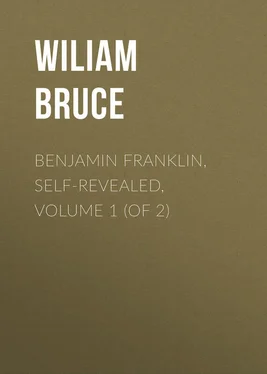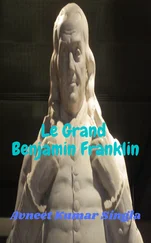Wiliam Bruce - Benjamin Franklin, Self-Revealed, Volume 1 (of 2)
Здесь есть возможность читать онлайн «Wiliam Bruce - Benjamin Franklin, Self-Revealed, Volume 1 (of 2)» — ознакомительный отрывок электронной книги совершенно бесплатно, а после прочтения отрывка купить полную версию. В некоторых случаях можно слушать аудио, скачать через торрент в формате fb2 и присутствует краткое содержание. Жанр: foreign_antique, foreign_prose, на английском языке. Описание произведения, (предисловие) а так же отзывы посетителей доступны на портале библиотеки ЛибКат.
- Название:Benjamin Franklin, Self-Revealed, Volume 1 (of 2)
- Автор:
- Жанр:
- Год:неизвестен
- ISBN:нет данных
- Рейтинг книги:5 / 5. Голосов: 1
-
Избранное:Добавить в избранное
- Отзывы:
-
Ваша оценка:
- 100
- 1
- 2
- 3
- 4
- 5
Benjamin Franklin, Self-Revealed, Volume 1 (of 2): краткое содержание, описание и аннотация
Предлагаем к чтению аннотацию, описание, краткое содержание или предисловие (зависит от того, что написал сам автор книги «Benjamin Franklin, Self-Revealed, Volume 1 (of 2)»). Если вы не нашли необходимую информацию о книге — напишите в комментариях, мы постараемся отыскать её.
Benjamin Franklin, Self-Revealed, Volume 1 (of 2) — читать онлайн ознакомительный отрывок
Ниже представлен текст книги, разбитый по страницам. Система сохранения места последней прочитанной страницы, позволяет с удобством читать онлайн бесплатно книгу «Benjamin Franklin, Self-Revealed, Volume 1 (of 2)», без необходимости каждый раз заново искать на чём Вы остановились. Поставьте закладку, и сможете в любой момент перейти на страницу, на которой закончили чтение.
Интервал:
Закладка:
I never doubted, for instance, the existence of the Deity; that he made the world, and govern'd it by his Providence; that the most acceptable service of God was the doing good to man; that our souls are immortal; and that all crime will be punished, and virtue rewarded, either here or hereafter. These I esteem'd the essentials of every religion; and, being to be found in all the religions we had in our country, I respected them all, tho' with different degrees of respect, as I found them more or less mix'd with other articles, which, without any tendency to inspire, promote, or confirm morality, serv'd principally to divide us, and make us unfriendly to one another.
And then he goes on to inform us that, as Pennsylvania increased in people, and new places of worship were continually wanted, and were generally erected by voluntary contributions, his mite for such purposes, whatever might be the sect, was never refused. This impartial attitude towards the different religious sects he maintained in every particular throughout his life, and from his point of view he had no reason to be dissatisfied with the result, if we may believe John Adams, who tells us: "The Catholics thought him almost a Catholic. The Church of England claimed him as one of them. The Presbyterians thought him half a Presbyterian, and the Friends believed him a wet Quaker." "Mr. Franklin had no – " was as far as Adams himself got in stating his own personal opinion about Franklin's religious views. To have been regarded as an adherent of every sect was a compliment that Franklin would have esteemed as second only to the declaration that he was merely an honest man and of no sect at all. It is certainly one of the most amusing facts narrated in the Autobiography that such a man, only a few years after religious bigotry had compelled him to fly from New England, the land for which Poor Richard, on one occasion, safely predicted a year of " dry Fish and dry Doctrine," should have been invited by Keimer, the knavish eccentric of the Autobiography , to become "his colleague in a project he had of setting up a new sect."
George Whitefield appears to have come nearer than anyone else to the honor of reducing Franklin to a definite religious status. For this celebrated man he seems to have felt an even warmer regard than that which he usually entertained for every clergyman who was a faithful exponent of sound morals. He begins one of his letters to his brother, John Franklin, with a reference to Whitefield, and then he laconically adds: "He is a good Man and I love him." In the Autobiography he certifies that, in his opinion, Whitefield was in all his conduct "a perfectly honest man ." But even Whitefield's call to the unconverted, which awakened the conscience of Philadelphia to such a degree "that one could not walk thro' the town in an evening without hearing psalms sung in different families of every street," failed to bring Franklin within the great preacher's fold. "He us'd, indeed, sometimes to pray for my conversion, but never had the satisfaction of believing that his prayers were heard. Ours was a mere civil friendship, sincere on both sides, and lasted to his death." These are the statements of the Autobiography . And a mere civil friendship Franklin was inflexibly determined to keep it; for we learn from the same source that, when Whitefield answered an invitation to Franklin's house by saying that, if Franklin made that kind offer for Christ's sake, he would not miss of a reward, the reply promptly came back: " Don't let me be mistaken; it was not for Christ's sake, but for your sake. " "One of our common acquaintance," says Franklin, "jocosely remark'd, that, knowing it to be the custom of the saints, when they received any favour, to shift the burden of the obligation from off their own shoulders, and place it in heaven, I had contriv'd to fix it on earth." It may truly be said, however, that nothing is recorded of the persuasive eloquence of Whitefield more amazing than the fact that it once swept Franklin for a moment off the feet on which he stood so firmly. He had made up his mind not to contribute to one of Whitefield's charitable projects which did not meet with his approval – but let Æsop tell the story in his own characteristic way:
I happened soon after to attend one of his sermons, in the course of which I perceived he intended to finish with a collection, and I silently resolved he should get nothing from me. I had in my pocket a handful of copper money, three or four silver dollars, and five pistoles in gold. As he proceeded I began to soften, and concluded to give the coppers. Another stroke of his oratory made me asham'd of that, and determin'd me to give the silver; and he finish'd so admirably, that I empty'd my pocket wholly into the collector's dish, gold and all.
But Franklin was not long in recovering his equipoise and in again wondering why Whitefield's auditors should so admire and respect him notwithstanding "his common abuse of them, by assuring them they were naturally half beasts and half devils ." Whitefield, he thought, made a great mistake in publishing his sermons; for litera scripta manet and affords a full opportunity for criticism and censure. If the sermons had not been published, Whitefield's proselytes would have been left, Franklin believed, to feign for him as great a variety of excellences as their enthusiastic admiration might wish him to have possessed. A Deist, if anything, Franklin was when Whitefield first came to Philadelphia, and a Deist, if anything, he was when Whitefield left it for the last time. When the latter wrote in his Journal, "M. B. was a deist, I had almost said an atheist ," Franklin, indisposed to be deprived of all religious standing, dryly commented: "That is chalk , I had almost said charcoal ." A man, he tells us in the Autobiography , is sometimes more generous when he has but a little money than when he has plenty, perhaps through fear of being thought to have but little, and it is possible that religious faith may sometimes be influenced by the same kind of sensitiveness. The truth of the matter was that as respects theological tenets and sectarian distinctions Franklin was an incurable heretic, if such a term is appropriate to the listless indifference to all dogmas and sects rarely broken except by some merry jest or gentle parable, like his Parable against Persecution or his Parable of Brotherly Love, with which he regarded every sour fermentation of the odium theologicum . When he heard that a New Englander, John Thayer, had become a Catholic, the worst that he could find it in his heart to say was: "Our ancestors from Catholic became first Church-of-England men, and then refined into Presbyterians. To change now from Presbyterianism to Popery seems to me refining backwards, from white sugar to brown." In commenting in a letter to Elizabeth Partridge, formerly Hubbard, a year or so before his own death on the death of a friend of theirs, he uses these words:
You tell me our poor Friend Ben Kent is gone; I hope to the Regions of the Blessed, or at least to some Place where Souls are prepared for those Regions. I found my Hope on this, that tho' not so orthodox as you and I, he was an honest Man, and had his Virtues. If he had any Hypocrisy it was of that inverted kind, with which a Man is not so bad as he seems to be. And with regard to future Bliss I cannot help imagining, that Multitudes of the zealously Orthodox of different Sects, who at the last Day may flock together, in hopes of seeing (mutilated) damn'd, will be disappointed, and oblig'd to rest content with their own Salvation.
Franklin's Kingdom of Heaven was one into which there was such an abundant entrance that even his poor friend, Ben Kent, could hope to arrive there thoroughly disinfected after a brief quarantine on the road. 7 7 Kent was evidently something of a character. In a letter to his friend Mrs. Catherine Greene, in 1764, Franklin said: "Mr. Kent's compliment is a very extraordinary one, as he was obliged to kill himself and two others in order to make it; but, being killed in imagination only, they and he are all yet alive and well, thanks to God, and I hope will continue so as long as, dear Katy, your affectionate friend, B. Franklin."
But it is in his Conte that the spirit of religious charity, by which this letter is animated, is given the sparkling, graceful form with which his fancy readily clothed its creations when form and finish were what the workmanship of the occasion required. Montrésor who is very sick, tells his curé that he has had a vision during the night which has set his mind entirely at rest as to his future. "What was your vision?" said the good priest. "I was," replied Montrésor, "at the gate of Paradise, with a crowd of people who wished to enter. And St. Peter asked each one what his religion was. One answered, 'I am a Roman Catholic.' 'Ah, well,' said St. Peter, 'enter, and take your place there among the Catholics.' Another said, that he belonged to the Anglican Church. 'Ah, well,' said St. Peter, 'enter and take your place there among the Anglicans.' Another said that he was a Quaker. 'Enter,' said St. Peter, 'and take your place among the Quakers.' Finally, my turn being come, he asked me what my religion was. 'Alas!' replied I, 'unfortunately poor Jacques Montrésor has none.' 'That is a pity,' said the Saint, 'I do not know where to place you; but enter all the same; and place yourself where you can.'"
Интервал:
Закладка:
Похожие книги на «Benjamin Franklin, Self-Revealed, Volume 1 (of 2)»
Представляем Вашему вниманию похожие книги на «Benjamin Franklin, Self-Revealed, Volume 1 (of 2)» списком для выбора. Мы отобрали схожую по названию и смыслу литературу в надежде предоставить читателям больше вариантов отыскать новые, интересные, ещё непрочитанные произведения.
Обсуждение, отзывы о книге «Benjamin Franklin, Self-Revealed, Volume 1 (of 2)» и просто собственные мнения читателей. Оставьте ваши комментарии, напишите, что Вы думаете о произведении, его смысле или главных героях. Укажите что конкретно понравилось, а что нет, и почему Вы так считаете.










![Benjamin Franklin - Memoirs of Benjamin Franklin; Written by Himself. [Vol. 2 of 2]](/books/747975/benjamin-franklin-memoirs-of-benjamin-franklin-wr-thumb.webp)
![Benjamin Franklin - Memoirs of Benjamin Franklin; Written by Himself. [Vol. 1 of 2]](/books/748053/benjamin-franklin-memoirs-of-benjamin-franklin-wr-thumb.webp)
